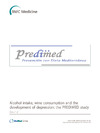Please use this identifier to cite or link to this item:
https://accedacris.ulpgc.es/jspui/handle/10553/19148
| Title: | Alcohol intake, wine consumption and thedevelopment of depression: the PREDIMED study | Authors: | Gea, Alfredo Beunza, Juan J. Estruch, Ramón Sánchez-Villegas, Almudena Salas-Salvadó, Jordi Buil-Cosiales, P. Gómez-Gracia, Enrique Covas, María Isabel Corella, Dolores Fiol, Miquel Arós, Fernando Lapetra, José Lamuela-Raventós, R.M. Warnberg, Julia Pinto, Xavier Serra-Majem, Lluis Martínez-González, Miguel Ángel Bautista Castaño, Inmaculada |
UNESCO Clasification: | 3206 Ciencias de la nutrición | Keywords: | Wine Alcohol Depression Cohort |
Issue Date: | 2013 | Journal: | BMC Medicine | Abstract: | Background: Alcoholic beverages are widely consumed. Depression, the most prevalent mental disorder worldwide, has been related to alcohol intake. We aimed to prospectively assess the association between alcohol intake and incident depression using repeated measurements of alcohol intake.Methods: We followed-up 5,505 high-risk men and women (55 to 80 y) of the PREDIMED Trial for up to seven years. Participants were initially free of depression or a history of depression, and did not have any history of alcohol-related problems. A 137-item validated food frequency questionnaire administered by a dietician was repeated annually to assess alcohol intake. Participants were classified as incident cases of depression when they reported a new clinical diagnosis of depression, and/or initiated the use of antidepressant drugs. Cox regression analyses were fitted over 23,655 person-years.Results: Moderate alcohol intake within the range of 5 to 15 g/day was significantly associated with lower risk of incident depression (hazard ratio (HR) and 95% confidence interval (95% CI) = 0.72 (0.53 to 0.98) versus abstainers). Specifically, wine consumption in the range of two to seven drinks/week was significantly associated with lower rates of depression (HR (95% CI) = 0.68 (0.47 to 0.98)).Conclusions: Moderate consumption of wine may reduce the incidence of depression, while heavy drinkers seem to be at higher risk. | URI: | https://accedacris.ulpgc.es/handle/10553/19148 | ISSN: | 1741-7015 | DOI: | 10.1186/1741-7015-11-192 | Source: | BMC Medicine [EISSN 1741-7015], v. 11 (1), 192, (Agosto 2013) | Rights: | by-nc-nd |
| Appears in Collections: | Artículos |
SCOPUSTM
Citations
103
checked on Jun 8, 2025
WEB OF SCIENCETM
Citations
98
checked on Feb 1, 2026
Page view(s)
295
checked on Jan 16, 2026
Download(s)
188
checked on Jan 16, 2026
Google ScholarTM
Check
Altmetric
Share
Export metadata
Items in accedaCRIS are protected by copyright, with all rights reserved, unless otherwise indicated.
